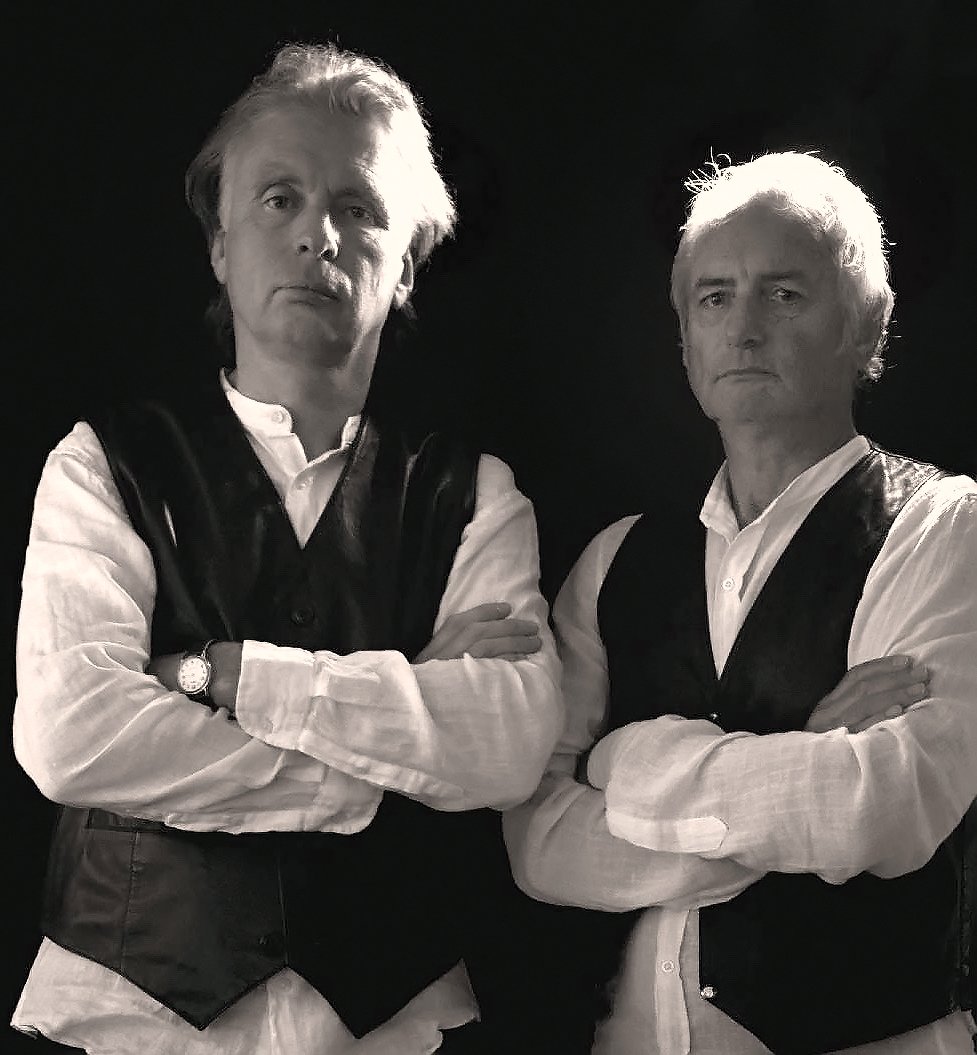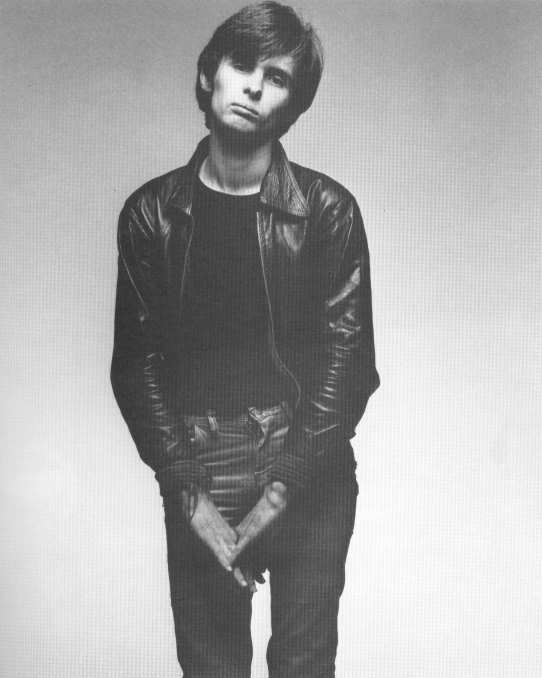
XTC fans have been rather spoiled with new product of late, after years of relative inactivity since the band ground to a halt in 2006, there have been a wave of re-issues, a feature-length documentary and, at the end of last year, the first EP from TC&I.
For the benefit of anyone not living in the XTC universe, TC&I are original drummer Terry Chambers (TC geddit?) and songwriter/bassist Colin Moulding.
The pair got back together when Chambers who had been domiciled for 34 years in Australia literally turned up on Moulding’s doorstep.
A trip to the pub ensued, during which Moulding casually mentioned that he’d been working on some songs and within days the pair had decamped to the bassist’s garage to begin recording the Great Aspirations EP.
Now the duo are actively considering the possibility of live dates – quite a prospect, when you consider that XTC famously quit touring way back in 1982.
In a wide-ranging interview, Moulding – the man dubbed “the handsomest man in Swindon” – tells Matt Catchpole what inspired the new songs and why his “scorched” relationship with Andy Partridge makes a full XTC reunion unlikely.

Moulding wrote all four songs on Great Aspirations, but credits Chambers with providing the impetus to get them recorded.
“They never took on solid purpose until Terry arrived,” Moulding says affably. “I was thinking what the hell am I going to do with these things? Since the band’s demise in 2006, I kind of fell off the radar a little bit. I did some sessions for some people in America for a good few years. They kept coming back and saying do you want to do this, do you want to do that? But I was kind of looking for something and Terry Chambers turned up at my door.”
Moulding admits it was “a bit weird” playing with Chambers after such a long time, but it didn’t take long for the old chemistry to kick in.
“He was only in the country a week and I had him in a recording studio, so it was a bit forboding for him really. But he took to it like a duck to water,” Moulding says. “It was probably something to do with being born in the same town, within a mile of each other and within a month of each other. There was something in the water I think.”
Chambers’ enthusiasm and work ethic, honed from more than three decades in the construction industry Down Under, encouraged Moulding to up his own game.
“It’s a strange thing what personalities can do and the make-up of bands, it triggers things,” Moulding says.
All four songs were written fairly recently, so Moulding felt no pressure to make them sound different to XTC.
“There’s been such a passage of time since the band dissolved,” he explains. “My mind was in a different kind of place.”
Kenny, the only song on the EP composed on guitar, takes aim at Academy School projects, which result in the loss of playing fields.
“I was school caretaker’s son, see, so I had this enormous playing field at my disposal and it really nurtured my imagination,” Moulding reveals. “I think a lot of the problems with young kids now is that they don’t get into things, they just hang about on street corners.”
Moulding argues that parents are seduced by the idea of schools becoming academies, but they are being sold a false prospectus.
“People think they must be getting something bigger and better, but an Academy is just a school, and if you’ve lost a playing field and you’ve lost all that beauty and nurturing kind of atmosphere. I think it’s an unfair exchange.”
Moulding says the song was partly inspired by Philip Larkin‘s poem The Whitsun Weddings.
“There’s a line in there about somebody coming up to bowl. You see the playing field from the train and that’s kind of what prompted it. I got this guitar riff that sounds very much like the motion of a train and then one thing led to another – a chain of thought.”

Comrades of Pop was also written with youth in mind, but from a very different perspective.
Misinterpreted by some as a dig at Partridge, Moulding says it’s actually a warning to young bands about the dangers of the record business.
“I’m towards the end of my career now, so I wanted to touch base with all the young popsters coming into the industry and say what you mustn’t do is get mixed up with the money men, otherwise they’re gonna really cause you some grief,” Moulding says with feeling.
“The people who say they’re on your side are not necessarily on your side, especially if there’s a paymaster involved in respect of a record company.”
Moulding argues that record companies will do anything to keep a band making records, including loaning them cash to pay off their debts.
But, the flip side is the band simply find their debts transferred to the record company, which gets its pound of flesh in the shape of low royalty payments.
“That’s what happened with us really,” Moulding says ruefully. “We had to fund a court case against our ex-manager and Virgin were the paymaster because they could keep paying the legal bill.
“We started to wonder if they were really on our side because we kept getting these enormous bills and we never seemed to be getting anywhere. You’ve got to be very careful.”
Moulding is referring to the fallout from XTC’s court tase against ex-manager Ian Reid, which eventually led to the band downing tools and going on strike in a bid to extricate themselves from a deal with Virgin Records.
In return for helping to fund the case against Reid, Virgin had taken a huge slice of royalty rates from the sales of the band’s records, meaning the XTC struggled to make any profit, despite estimating that they’d earned Virgin around £30m.
The final straw came in 1992, when outraged at Virgin’s rapid withdrawal of the Wrapped In Grey single – likened by Partridge to a baby being stifled in its cot – the band withdrew their labour for six years, until Virgin finally terminated their contract.

In the song Greatness, Moulding pays tribute to huge talents he admires, including Paul McCartney, Alfred Hitchcock, Steven Spielberg and George Gershwin.
But there’s a sting in the tail, as Moulding laments that it’s now “old fashion{ed} to aspire” and proclaims “I won’t wallow in the mire“.
In a heartbeat the song turns into a critique of mediocrity; of art which doesn’t strive for, well, greatness.
“I think we live in a country where everyone gets a prize now, you know,” Moulding says. “I think it wouldn’t hurt if we had a few hard knocks. It toughens you up for the task in hand.”
He’s quick to point out that many other artists could have featured in the lyrics, if only they fitted the music.
“I could have probably named a hundred others, but it just wouldn’t have had the scansion. I wanted to put David Lean in, for example, but it wouldn’t fit.
“You’ll notice I made the second verse American, the first English,” he laughs. “I thought I’d better put a balance in, so I had my commercial head on even as I was writing it.”
I take the opportunity to ask what artists in the current music scene he admires and he’s temporarily lost for words.
“Somebody asked me this the other day and there wasn’t a record that I could really say that I was really impressed with,” he explains. “If you hear something good it’s generally on the fringes of the industry.”
After a pause he comes up with The La’s album from 1988, before going on to recommend Allyson Seconds‘ Little World from 2016.
Moulding is equally underwhelmed by dominant chart performers like Ed Sheeran and Adele.
“Generally there’s nothing to get your teeth into. It’s miserable crying in your beer stuff about relationships, there’s too much angst and misery for my liking. I like optimism, if you can put it into a song, even if it’s about death!”
All of which brings us neatly to Scatter Me (see video below) in which he directly confronts his own mortality.
Moulding says the song was stirred by walks he regularly takes along The Downs between Wantage and Swindon.
“When you’re walking you’ll come across a little shrine, a little cross put into the ground, with some flowers around it and a photograph and you think, well, somebody’s ashes have been scattered there,” Moulding explains.
“There was also the song When I’m Dead and Gone by McGuinness Flint ‘You want to leave some happy woman living on.’ – I thought that was a brilliant sentiment and that’s kind of stayed with me and it’s not surprising that it’s eventually ended up in one of my songs.“
Moulding says recording the EP DIY-style in his garage was not without its challenges, but also very enjoyable.
“Necessity knows no bounds, as they say” he chuckles.”It was a bit of a quest, but it’s been quite good fun. The band in-jokes came back pretty quickly.”
It was a marked contrast to the XTC days when the band would have a “small arsenal” of sound engineers and tape ops to assist them, but not being on the studio clock did have its advantages.
“There was no pressure, that was the beauty of it, we could just let rip,” he says. “Of course there were no young ladies to bring us tuna fish sandwiches like in the old days when times were good.
“It was the two of us rattling around in this garage, trying new things. It was a noble effort, I think.”
Moulding wasn’t new to recording of course and had dipped his toe back in the water, following the demise of XTC, by working with prog-rock musician/producer Billy Sherwood.
“You have people like Rick Wakeman playing on these things; Geoff Downes – real proggers and very good musicians. It was kind of a privilege to throw my lot in with them,” Moulding says.
“Through Billy, I got involved with one really good outfit called Days Between Stations. We did a track called The Man Who Died Two Times – that was a very good song, I thought, and I’m singing the lead vocal.”
The “prog stuff,” as Moulding puts it, helped him recover from the slough of despond which descended after XTC’s slow and painful end.
The band’s final studio album Wasp Star (Apple Venus Volume2) came out on Cooking Vinyl in 2000, but the band, reduced by then to a duo of Moulding and Partridge, drifted on until 2006.
“I just think we were two old men who didn’t really talk much,” Moulding admits. “If we had explained what our intentions were, and what our thoughts were for the future, it wouldn’t have dragged on and fizzled out in the way that it did.
“There was no official announcement that we’d finished. I just got wind that Andy didn’t really want to make another record, but he didn’t tell me and maybe he didn’t know himself. I don’t know.”
The band’s demise left Moulding bereft and for two years he did very little but watch TV and play tennis.
“I thought Christ! What now? I’d been playing with Andy since I was 16 and then all of a sudden it was no more. I just mobbed about the house and made a bloody nuisance of myself with the missus.
“it was like getting over a love. You couldn’t start a new romance, until the old one had got out of your system,” he says candidly.
Relations between the two songwriters deteriorated further when Partridge began supervising re-issues of the band’s back catalogue.
Moulding objected to the release of the band’s demos on the 8-volume Fuzzy Warbles sets and refused to allow his songs to be included.
He’s equally unhappy with Partridge’s plan to put demos on deluxe album re-releases, describing it as a “tragedy”.
“He says: ‘Well the fans want them’ and I say: ‘Well the fans have had them.’ So there’s a bit of rub there, but best not to air one’s washing in public,” Moulding says.

There had been “healthy competition” between Moulding and Partridge from the early days of the band, when Moulding began songwriting at the suggestion of a roadie.
“He said: ‘You ought to start writing, otherwise you’ll miss out.’ So I owe him a cheque I think,” Moulding says.
Until then Partridge had been the dominant writer in the band and Moulding admits his early efforts were heavily influenced by his bandmate.
“I kind of wrote to fit in, I think,” Moulding remembers, “So I wrote songs that were kind of a watered down version of Andy’s mentality really. It wasn’t until the third album really Drums and Wires that I began to write in my own hand.”
Partridge continued to write the majority of the songs, but many of Moulding’s compositions ended up being selected as singles by Virgin’s A&R department.
“I think it spurred Andy on in a lot of ways. I think his writing changed considerably when I was having success with some of the singles. I think his writing became a lot more melodic.
“Record companies then really wanted you to write singles. Unless you had a single you were dead, so it was very gratifying to do all that single stuff,” Moulding says.
It was his 1979 song Making Plans For Nigel – featuring a distinctive, unorthodox drum pattern from Chambers – that really launched the band in the UK national consciousness, spending 11 weeks in the charts, peaking at No17.
The song was less popular with bosses at British Steel who were reportedly so unnerved by the line: ‘He has his future in a British Steel’ – that they summoned four Sheffield workers named Nigel to confirm that they were, indeed, happy in their world.
Moulding says songwriting provided compensation for the lack of live performances after XTC ceased touring following Partridge’s well documented health problems.
In last year’s This is Pop documentary, both Chambers and longtime member Dave Gregory – the guitarist who replaced Andrews – lamented the chance to perform live.
Chambers even states it was the key factor in his decision to quit the band, but Moulding sees it as a “double-edged sword”.
“I can understand the others’ point of view, especially Terry – the touring was a big part of it for him. But I think when you’re a writer there’s always consolation, because you’ve always got this thing back home that you can delve into.”
Being the father of young children also made staying at home a more attractive proposition.
“Andy and myself were married old farts with kids. The first few years of my kids’ upbringing I didn’t see them. So in a way, stopping touring when we did meant I got to see my kids grow up.”
Though he admits first watching the documentary “through the rails of the stairs,” he is largely pleased with the final result.
“I think it’s very good, it tells a story, but there are other tributaries, which this chap couldn’t go into. It’s been quite well received in America of late, so it’s very fortuitous for Terry and I.”

Famously hailing from “unfashionable” Swindon – “Our manager coached us to say: ‘Tell ’em you come from Mars!, but don’t tell ’em you come from Swindon,” XTC benefited from the signing frenzy that followed the advent of punk.
“In the mid-’70s it was very hard to break into the music industry. It was run by public schoolboys, punk blew all that away,” Moulding recalls. “That DIY kind of thing confused the hell out of record companies. They didn’t know what to make of it, so they signed everybody! And that’s the ticket that got us in!”
The kind of band the term ‘quirky’ might have been invented for, Moulding remains unsure of XTC’s place in the punk/new rave revolution.
“I knew it was some sort of movement, some sort of grass roots thing. But where we fitted in with it I wasn’t sure,” he explains. “The only comparison I would make was we played songs at over 150 beats per minute, just like they did.
“I wouldn’t say we were political. Andy was writing most of the songs then and they were mostly about comics and dance crazes, so we were kind of outside all of that. I was just glad to be able to give up my job,” he laughs.
Few bands from those heady days went on to forge a career as long and diverse as XTC’s and Moulding perversely puts that down to their lack of meteoric success.
“If you’ve got a lack of success, you’ve still got a yearning for it,” he argues. “We had a bit of success, a teasingly small portion in the early days and then it was taken away from us and then we started to get a following in America – so there was always some bait there to keep you going.”
“I think if we’d shot up to the top, the descent would have been a lot quicker. Perhaps that’s the way to do it, to have a career that’s always bubbling under. It’s kind of nice being thought of as the underdogs. You’re running to catch up with the leader and he knows you’re on his shoulder. And it’s him that has to look back.”
While they were recording, Moulding says relations within the band were generally healthy, it was during their down time that things began to sour.
“You stay around because you think the material’s good and want to play on it. That’s what holds you together, but when you’re not making albums, then all the arguments come to the fore and little things mean a lot.”

These days Moulding admits he’s not on great terms with either Partridge or Gregory.
“The relationships are a little bit scorched I suppose, we’ve had a few run-ins over the last few years,” he says.
“We still communicate by email, but I haven’t seen Andy for yonks. To a lesser extent Dave as well, we had a little bit of a run-in a few years ago, but nowhere near the unpleasantness that Andy and I have shared. But Christ, that’s bands for you.”
The chances of a reunion then, look somewhere between slim to impossible.
“It would seem unlikely, bearing in mind all the bleach that’s gone down the lavatory and around the U-bend,” he says ruefully. “All the good bacteria has been killed off, I think. To nurture new germs at our age would be dangerous, I think.”
The outlook for TC&I though is a lot more more rosy.
Moulding doubts they’ll make an album – “They take a long time and at 62 you don’t have much time” – but there will be more music.
“We’ll do some more Terry and I,” he says confidently, “Possibly more EPs, three or four here, half a dozen there.”
And in the meantime there’s that mouth-watering prospect of live shows.
“Maybe, if we can find two ‘erberts to come along with us,” he teases. “The main thing is, We’re just going to have some fun. We don’t have record company backing, but by the same measure we don’t have record company interference, so we’re happy to take it as it comes.”
- The Great Aspirations EP is available through Burning Shed and pledgemusic.com
- For more about TC&I visit their Facebook page here
.